Taipei Mayor Ko Wen-je (柯文哲) yesterday said that he is not criticizing the Democratic Progressive Party (DPP) to gain votes for his Taiwan People’s Party (TPP) in the Jan. 11 elections, but because he believes there is a standard for what is right.
The existence of “third force” parties means that the two major parties are not doing a good job, added Ko, who is also the founder and chairman of the TPP.
He made the remarks in response to media queries about why he often criticizes Presidential Office Secretary-General and former Kaohsiung mayor Chen Chu (陳菊) of the DPP, and whether criticizing the pan-blue and pan-green camps is part of his election strategy.
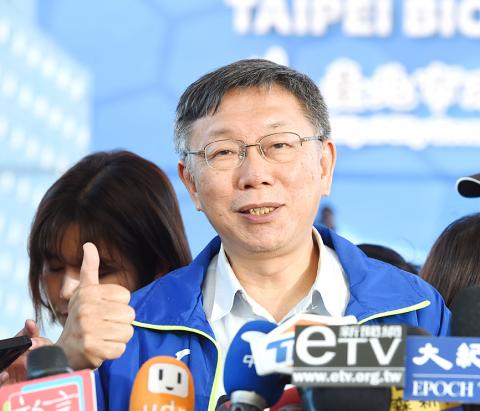
Photo: Fang Pin-chao, Taipei Times
On Friday, Ko said that one of the reasons Kaohsiung Mayor Han Kuo-yu (韓國瑜), the Chinese Nationalist Party’s (KMT) presidential candidate, “escaped” from Kaohsiung to run for president was because of the high public debt left by Chen’s administration.
Han on Sunday said that Kaohsiung has the most difficult financial situation in Taiwan, so he is grateful to Ko for always speaking up for him.
Ko yesterday said that Chen should explain how the debt was created and how it affects the city’s administration.
DPP Legislator Chung Kung-chao (鍾孔炤), a former Kaohsiung Labor Affairs Bureau director, on Sunday posted two charts on Facebook explaining how Chen was forced to self-finance several infrastructure development projects, as the then-KMT-led central government did not provide enough funding.
He wrote that Chen repaid more debt than the debt created during her term as mayor, so the high debt was caused by the then-KMT-led central government failing to keep its funding promises.
The city government led by Han has increased public debt by NT$6.4 billion (US$211.5 million) this year, he added.
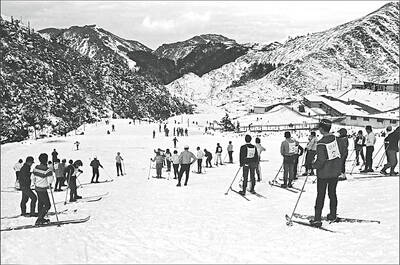
A strong continental cold air mass and abundant moisture bringing snow to mountains 3,000m and higher over the past few days are a reminder that more than 60 years ago Taiwan had an outdoor ski resort that gradually disappeared in part due to climate change. On Oct. 24, 2021, the National Development Council posted a series of photographs on Facebook recounting the days when Taiwan had a ski resort on Hehuanshan (合歡山) in Nantou County. More than 60 years ago, when developing a branch of the Central Cross-Island Highway, the government discovered that Hehuanshan, with an elevation of more than 3,100m,
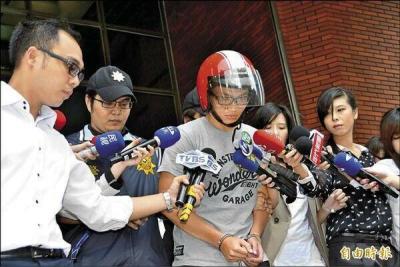
Death row inmate Huang Lin-kai (黃麟凱), who was convicted for the double murder of his former girlfriend and her mother, is to be executed at the Taipei Detention Center tonight, the Ministry of Justice announced. Huang, who was a military conscript at the time, was convicted for the rape and murder of his ex-girlfriend, surnamed Wang (王), and the murder of her mother, after breaking into their home on Oct. 1, 2013. Prosecutors cited anger over the breakup and a dispute about money as the motives behind the double homicide. This is the first time that Minister of Justice Cheng Ming-chien (鄭銘謙) has
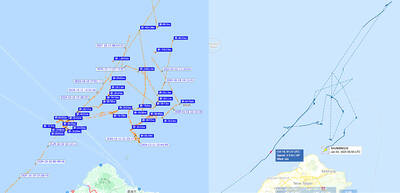
SECURITY: To protect the nation’s Internet cables, the navy should use buoys marking waters within 50m of them as a restricted zone, a former navy squadron commander said A Chinese cargo ship repeatedly intruded into Taiwan’s contiguous and sovereign waters for three months before allegedly damaging an undersea Internet cable off Kaohsiung, a Liberty Times (sister paper of the Taipei Times) investigation revealed. Using publicly available information, the Liberty Times was able to reconstruct the Shunxing-39’s movements near Taiwan since Double Ten National Day last year. Taiwanese officials did not respond to the freighter’s intrusions until Friday last week, when the ship, registered in Cameroon and Tanzania, turned off its automatic identification system shortly before damage was inflicted to a key cable linking Taiwan to the rest of
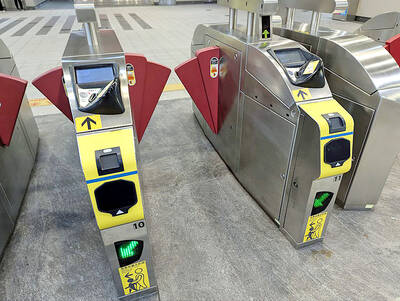
TRANSPORT CONVENIENCE: The new ticket gates would accept a variety of mobile payment methods, and buses would be installed with QR code readers for ease of use New ticketing gates for the Taipei metro system are expected to begin service in October, allowing users to swipe with cellphones and select credit cards partnered with Taipei Rapid Transit Corp (TRTC), the company said on Tuesday. TRTC said its gates in use are experiencing difficulty due to their age, as they were first installed in 2007. Maintenance is increasingly expensive and challenging as the manufacturing of components is halted or becoming harder to find, the company said. Currently, the gates only accept EasyCard, iPass and electronic icash tickets, or one-time-use tickets purchased at kiosks, the company said. Since 2023, the company said it